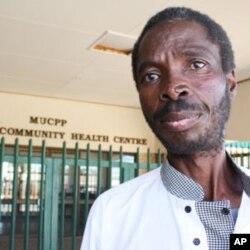Outside the Mangaung Community Health Center, its walls and pillars marred by crude graffiti, Lekgotla Nkopane,52, is fiddling with a plastic packet of pills. His hands are dirt-worn, his palms hardened from decades of brutal, mind-numbing toil. His red eyes give him an air of permanent fatigue.
“I used to work on construction sites. Now I am too weak to work,” Nkopane says.
In a vehicle idling nearby, two young men discuss the latest challenge to South Africa’s attempt to provide urgent antiretroviral (ARV) therapy to millions of HIV-infected people.
Sello Mokhalipi and Thabo Nkwe are fieldworkers for the Treatment Action Campaign (TAC), which lobbies for access to HIV drugs for all South Africans who need them. Without the medicine, the immune systems of people with HIV/AIDS become extremely weak, opening them up to illnesses that can kill them.
Mokhalipi and Nkwe approach Nkopane, who tells them he’s been taking ARVs for four years. But four months ago, nurses told him they’d run out of drugs. Without them his treatment was interrupted, which is extremely dangerous because it results in resistance to HIV medication. Since then, he says, he’s been “very sick.”
“This is the first time in four months that the nurses have given me my medicine. But I don’t know for how long. I am afraid they will tell me again, ‘Sorry, we have no drugs for you,’” Nkopane tells the activists. “I am scared of dying.”
History repeats itself
For Mokhalipi and Nkwe, Nkopane’s story is nothing new. They spend their days crossing the Free State, and especially the sprawling Mangaung area, on the outskirts of the province’s capital, Bloemfontein. The township is home to 650,000 people, many infected with HIV. Most of Mangaung residents live in poverty, in simple brick homes or tin shacks. Most are unemployed.
“The roads here are nothing but dirt,” says Mokhalipi.
South African law requires the government to provide ARVs at certain state hospitals and clinics, including the on in Manguang. But Mokhalipi’s and Nkwe’s cell phones ring constantly with reports of people getting sick and dying because state facilities aren’t supplying the medicine.
Health activists say some provincial health ministries deny there is a problem. Free State's health officials say there is not shortage of ARVs, and that they are being distributed to everyone who needs them.
“[But] in our office we have (sworn) affidavits [by people] who have been neglected, due to the fact of not getting medication in time,” says Nkwe.
Provision of ARVs is part of an ambitious National Strategic Plan of the national government. The goal is to cut new infections by half over the next two years. It also aims to provide treatment for opportunistic infections caused by HIV and psychological and nutritional counseling for those who are ill.
The National Health Minister Aaron Motsoaledi recently acknowledged that the South African government will not be able to meet its target of providing ARV treatment to 80 percent of HIV-infected people by 2011. Responding to the crisis, the national government has pledged an extra 900 million rands (US$ 120 million) to buy more ARVs to prevent clinics from running out before next April.
But the Treatment Action Campaign says the money isn’t enough to avert deaths and that “bureaucracy” is slowing the delivery of the funds. Either many clinics have already run out of drugs, say the activists, or nurses continue to ration pills fearing “stock outs” in the near future.
In late 2008 and early 2009, ARV shortages swept the Free State, with the South African HIV Clinicians Society estimating that at least 30 people in the province were dying every day because of a lack of essential medication. Now there are fears that history is repeating itself.
"The damage [caused by] these shutdowns is absolutely phenomenal. People die,” says Professor Francois Venter, president of the society.
“People are being told to wait until next year for drugs -- until the beginning of the financial year in April (2010). This will be much too late for many of them. Many are going to die of AIDS-related illnesses,” Mokhalipi told VOA.
Unanswered calls
The Free State government is ignoring the unfolding tragedy, says patient advocate Mokhalipi. He says in recent months he sent six letters to the province’s health minister, Sisi Mabe, appealing for help, but they remain unanswered. Mokhalipi says the minister answered a seventh letter after she became aware that the TAC had complained to her boss, provincial premier Ace Magashule.
Mabe then met with the activists, but Mokhalipi says she refused to answer questions about the crisis, demanding “written queries,” to which she has not yet responded.
“It all started a few months back when the TAC exposed the fact that the Free State provincial authorities were failing to put people on treatment, as required by law, and that people were therefore dying. From that time on, they have hated us, because they say we made them look bad,” says Mokhalipi. “But actually they made themselves look bad, through poor planning and misuse of money that was meant to be used to treat sick HIV-positive people.”
The TAC has expressed respect for the National Health Minister Motsoaledi. It has appealed to him to replace ineffective staff inside his provincial health departments through wants the government to assume responsiblity for providing ARVs in the crisis-wracked provinces like the Free State.
Consequences of failure
Thabo Nkwe says the HIV drug shortages, even if resolved “right this minute,” could potentially hurt South Africa’s response to the HIV/AIDS epidemic “for years to come.”
“When people don’t get drugs, and they die, other HIV-infected people say, ‘Why should we test ourselves for HIV if we are going to die anyway?’ And so the disease spreads and spreads,” he says.







